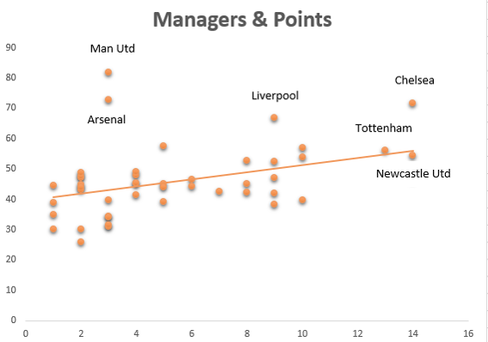The recently published Football and Money – A Soccernomics Guide has a very interesting section on the role of the manager in improving team performance. In a nutshell, it suggests that while most managers have little impact, a minority do exist that have a disproportionately positive impact on team performance. Names such as Sir Alex Ferguson and the lesser known Paul Sturrock are mentioned. Previous work by Declan Jordan on this site has examined a similar issue here.
A couple of weeks back Sky Sports ran a wonderful advertisement for the Premier League clash between Arsenal and Chelsea where footage of Arsene Wenger, manager of the Gunners since 1996, was shown with each of the thirteen managers of Chelsea between then and now. The two clubs couldn't be more different when it comes to their approach to hiring and firing managers.
One must assume that both the people in charge of Arsenal, and those in charge of Chelsea, believe their policy concerning managers is the most productive for their club. It’s hard to argue that Wenger has not been successful. In fact, only Sir Alex has enjoyed more success as a manager since 1996 in England. On the other hand, Guus Hiddink's arrival at Stamford Bridge has seen a marked improvement in Chelsea’s fortunes. Sacking Jose Mourinho appears to have worked, at least in the short run.
But does this hold throughout time? Below is a quick analysis of the now forty-six clubs that have completed at least one season in the English Premier League, since its foundation in 1992.
Chelsea’s policy appears to work. Only Newcastle have had as many managers since 1992, but their strategy has been less successful. At the other end, Manchester United and Arsenal’s stability can only be admired. So while the numbers may (statistically) indicating sacking works, almost every United fans must yearn for the days of Sir Alex. Arsenal fans should cherish Wenger while they have him.

 RSS Feed
RSS Feed